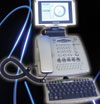

Alarm and event notification is one of the most important functions in plant automation as it assists in optimising plant efficiency and safety. Consider the additional advantages that can be leveraged by breaking down the barriers that exist between plant alarms and events, generally limited to the plant floor, and the personnel outside the immediate plant who would benefit from real-time notifications. A trend that has recently become popular is to pull specific events and alarms from the plant floor and push them towards the groups or individuals who require the information. This has resulted in the concept of remote event notification (REN).
REN gives the individual the power to configure custom alarms to trigger an e-mail or SMS notification to a group of users. This configuration can be based on simple ON/OFF changes, or can be more complex where specific values are greater or less than predetermined limits. Each event notification can then be configured to be valid for a specific time period, after which it will expire. This enables close monitoring of specific processes or plant areas during plant or process changes, without major reconfiguration required to remove these events later.
This configuration is completely independent of the alarms and events already configured in the control system, changes of the REN will not have any effect on the existing alarming system of the plant. The REN will then notify personnel of specific status and conditions on a 24/7 basis. This ability to send automated event-based notifications on exceptions together with the functionality to escalate notifications based on changing conditions is the most sought after requirement of customers.
How and where should REN be implemented?
To implement an REN system successfully, the engineers or specialists compiling the event specifications will start by identifying those alarms that need to be distributed to a specific group of users. This list can then be categorised into two groups, namely, the Critical Event Group and Non-critical Event Group. The Critical Event Group is the set of alarm notifications requiring immediate intervention by a specialist engineer or manager experienced to handle the situation. The Non-critical Event Group consists of the rest of the specified events.
The following examples illustrate the versatility and flexibility of an REN system throughout the various disciplines of the plant:
* Process engineers require notification when a plant temperature, flow, level or pressure value exceeds or drops below a specific value as they have noticed a specific trend they want to monitor.
* Process engineers want to be notified when product quality drops below or exceeds a specific threshold so they can take action before waste is produced.
* Maintenance staff wants to know when a tank level becomes zero, enabling them to start lock-out procedures for planned maintenance work.
* Laboratory personnel need to be notified when a particular batch process is complete, in order to take samples.
* Managers want to be notified when production throughput or performance drops below a specified threshold value or when a major production line, piece of equipment or process shuts down or breaks down.
It is important to note that such a system should be flexible enough to offer engineers and specialists the ability to configure and categorise their own specific notifications based on custom signals and limits, as well as how they receive a notification. Popular methods of notification are the combination of e-mail and SMS. For alarms and events from the Non-critical Events Group an automated e-mail may be sufficient, as it is easily distributed, scalable and cost-effective. For the Critical Events Group, the immediate sending of an SMS showing short critical bits of information distributed across a selected audience is commonly used.
What do people look for in REN solutions?
* The crucial functionality users require from a remote alarming solution includes:
* Simple, easy-to-use user interfaces.
* Real-time notification of critical plant events.
* Multiple events and trigger values must be configurable to notify one or multiple users.
* Multiple events must be configurable for one system (tag) value without affecting control alarms.
* Configured event notifications must be cleared automatically based on an event expiry date.
* Events must be distributable via e-mail, SMS, or both.
* Minimal additional infrastructure must be required and the solution must be integrated into the company’s exiting e-mail and control systems.
The bottom line
REN is especially effective in cases where a company has dispersed sites together with a limited workforce where the available specialists may be centralised at a specific location. In this way, personnel can be informed of events as they happen for accelerated response times.
As we are living in the information era, it is mandatory that information, especially events regarding plant operations, be distributed to all concerned in a format that enhances decision making and response. In essence the concept of REN entitles the use of various commercial notification systems to send real-time alerts directly to the experts who may be situated outside the immediate plant area.
For more information contact Gerhard Greeff, Bytes Systems Integration, +27 (0)11 205 7000, [email protected], www.bytessi.co.za

© Technews Publishing (Pty) Ltd | All Rights Reserved